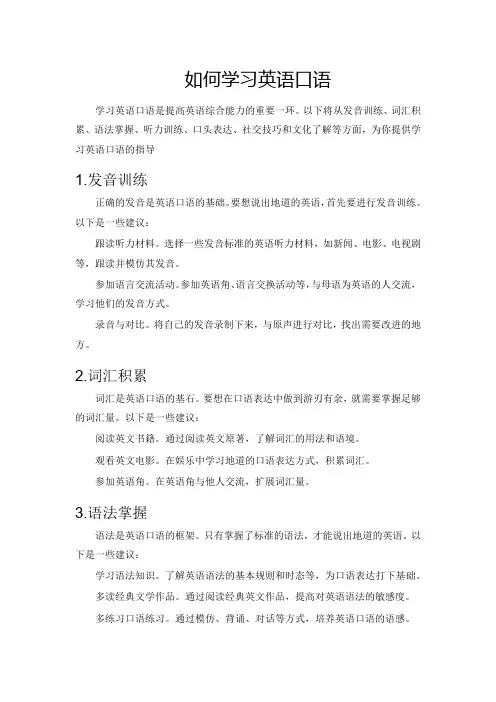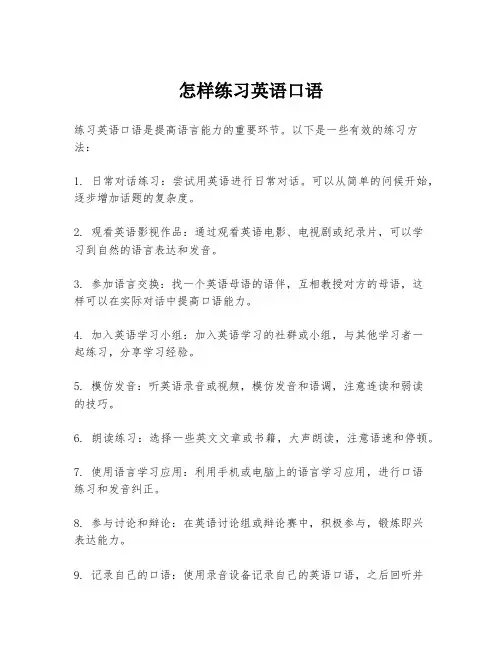英语口语学习
- 格式:pdf
- 大小:530.28 KB
- 文档页数:42

如何学习英语口语学习英语口语是提高英语综合能力的重要一环。
以下将从发音训练、词汇积累、语法掌握、听力训练、口头表达、社交技巧和文化了解等方面,为你提供学习英语口语的指导1.发音训练正确的发音是英语口语的基础。
要想说出地道的英语,首先要进行发音训练。
以下是一些建议:跟读听力材料。
选择一些发音标准的英语听力材料,如新闻、电影、电视剧等,跟读并模仿其发音。
参加语言交流活动。
参加英语角、语言交换活动等,与母语为英语的人交流,学习他们的发音方式。
录音与对比。
将自己的发音录制下来,与原声进行对比,找出需要改进的地方。
2.词汇积累词汇是英语口语的基石。
要想在口语表达中做到游刃有余,就需要掌握足够的词汇量。
以下是一些建议:阅读英文书籍。
通过阅读英文原著,了解词汇的用法和语境。
观看英文电影。
在娱乐中学习地道的口语表达方式,积累词汇。
参加英语角。
在英语角与他人交流,扩展词汇量。
3.语法掌握语法是英语口语的框架。
只有掌握了标准的语法,才能说出地道的英语。
以下是一些建议:学习语法知识。
了解英语语法的基本规则和时态等,为口语表达打下基础。
多读经典文学作品。
通过阅读经典英文作品,提高对英语语法的敏感度。
多练习口语练习。
通过模仿、背诵、对话等方式,培养英语口语的语感。
4.听力训练听力是英语口语的基础。
只有听得懂才能说得好。
以下是一些建议:听英文歌曲。
通过听英文歌曲,提高对英语听力的敏感度。
观看英语电视节目。
观看英语电视节目,了解不同场景下的英语口语表达方式参加语言交流活动。
与母语为英语的人交流,提高英语听力和口语表达能力。
5.口头表达口头表达是学习英语口语的关键。
只有多说多练,才能提高口语水平。
以下是一些建议:参加语言交流活动。
参加英语角、语言交换活动等,与母语为英语的人交流,提高口语表达能力。
不断练习说英语。
通过模仿、背诵、对话等方式,不断练习口语表达,提高口语水平。
6.社交技巧学好英语口语,社交技巧也是必不可少的一部分。

怎样练习英语口语
练习英语口语是提高语言能力的重要环节。
以下是一些有效的练习方法:
1. 日常对话练习:尝试用英语进行日常对话。
可以从简单的问候开始,逐步增加话题的复杂度。
2. 观看英语影视作品:通过观看英语电影、电视剧或纪录片,可以学
习到自然的语言表达和发音。
3. 参加语言交换:找一个英语母语的语伴,互相教授对方的母语,这
样可以在实际对话中提高口语能力。
4. 加入英语学习小组:加入英语学习的社群或小组,与其他学习者一
起练习,分享学习经验。
5. 模仿发音:听英语录音或视频,模仿发音和语调,注意连读和弱读
的技巧。
6. 朗读练习:选择一些英文文章或书籍,大声朗读,注意语速和停顿。
7. 使用语言学习应用:利用手机或电脑上的语言学习应用,进行口语
练习和发音纠正。
8. 参与讨论和辩论:在英语讨论组或辩论赛中,积极参与,锻炼即兴
表达能力。
9. 记录自己的口语:使用录音设备记录自己的英语口语,之后回听并
分析自己的发音和语法错误。
10. 不断实践:抓住一切机会使用英语,无论是在旅行中、工作中还是日常生活中。
通过这些方法的持续练习,你的英语口语能力将会得到显著提高。
记住,语言学习是一个长期的过程,需要耐心和持续的努力。

怎么入门学英语口语-英语口语怎么练习有效入门学英语口语的方法有这些:1.多听英文歌;2.与他人交流;3.与自己对话;4. 听别人说。
如果想具体了解怎么入门学英语口语,那无妨接着往下看吧!1、多听英文歌一般听歌是学习一种〔外语〕最简单的方法,因为没有死记硬背那样枯燥,虽然听英文歌不是很好理解,但记得熟能生巧,多听听就好。
2、与他人交流交流不仅仅可以打破僵局,关于学习一种语言,交流同样很重要,多说才知哪里说得不对,互相交流互相学习。
3、与自己对话这种状况是针对刚开始学习一门语言的时候,害怕与别人交流,那必须要先与自己交流,说出来不仅可以增加记忆,还可以学习口语。
4、听别人说平常我们可能除了上课很少可以听到有人使用英语对话,这就必须要我们常常去看一些英文视频,可以是有趣的电影,可以记忆就好,学者标准的发音对自己的口语也会有很大帮助。
2如何学好入门英语口语1. 录音。
如果你听不到自己的发音问题,就很难改正。
试着把要说的话录下来,并与以英语为母语的人进行比较,这是处理口语问题是非常有效的。
2. 慢慢说。
很多英语学习者常说,如果说得太快,很容易养成坏习惯。
因为口语考试的禁忌就是太快,太模糊。
所以我们必须准确、流利,天天学习一些基本的语言,从一个音节开始,然后把几个单词组成一个句子,这样你就可以开始慢慢地表达你的想法了。
3. 脑补说话的心情。
闭上眼睛,在你说之前想想怎么发音,想象一下面部动作,这可以与看电影和关注好莱坞明星,如何逐字逐句地说那些迷人的词语结合起来。
4. 观察自己发音的嘴型。
当你发出固定的声音时,站在镜子前,看看嘴巴、嘴唇和舌头的位置。
把它和你看到的母语发音比较一下,通常你也可以用视频来记录你的发音,仔细观察和比较。
3英语口语怎么学习有效1.学习发音要想拥有一口流利的口语,熟悉每个字母的发音是基础,所以我们要从学习每一个元音和辅音开始,只有把每个音符进行掌握才干在碰到新单词时脱口而出,才干够将整一句英语融合发音,拥有一口流利的口语。

如何学习英语口语的方法【优秀4篇】语言是一种交流的工具,为了互相交流,英语被用在不同的场合。
所以学习英语的有效方法,尤其是学习英语口语的有效方法,变得越来越重要了。
小编为朋友们精心整理了4篇《如何学习英语口语的方法》,希望能为您的思路提供一些参考。
学好英语口语的方法篇一1、动口前先积累如果想用英语表达一些内容,需要具备英语表达能力,如果想要有表达的能力,必须首先有英语知识的积累。
英语词汇的积累和语法的运用对提高英语表达能力起着至关重要的作用。
因此,如果想学好英语口语,首先需要有足够的英语知识储备。
2、先听后说“听”是学习“说”的基础,只有听到了才能学会说。
婴儿学话是这样,学习英语也是这样,认真的去听,掌握音标和单词的标准发音。
“听”的方式有很多种,比如自己喜欢的英文歌曲,感兴趣的英文节目,纯正的以英语为母语的人的录音等。
我们听的越多,英语感自然就会越强,这样我们的口语发音就会更接近标准。
3、张口需要胆子大有很多人私下里练习得很好,但当老师在课堂上或公共场合提问时,往往就不敢开口了。
怕出错,怕发音不标准,怕别人听不懂,怕被老师责备。
周而复始,便变得不敢开口说话,所以英语口语水平总是不能提高,这一现象主要是由于学生缺乏口语练习的机会,导致他们在公共场所缺乏自信、焦虑和紧张,影响了自己的正常思维,使他们无法流畅、连贯地表达自己想要表达的内容。
消除这种心理障碍需要我们大胆地说出来,不怕犯错误,更能及时改正,不怕被嘲笑,被嘲笑说明我们还有进步的空间。
学好英语口语的方法篇二1、创造一个轻松的学习范围为了提高学生的口语表达能力,增强学生的表达意识,一个关键条件是让学生有一个轻松自由的学习环境,给学生一个自由玩耍和表达的舞台,从而消除紧张情绪,帮助学生纠正意志力障碍。
在这一过程中,教师应改变传统的教育模式,明确学生口头表达的实际困难,建立平等和谐的师生关系,创造轻松自由的学习氛围,容忍学生口头表达的错误,从而克服学生的紧张情绪。

英文口语怎么练互相提问的方式学习。
如果两个人的英语水平还都可以的话,我们可以通过互相学习的方式,提升英语口语水平,比如,可以采纳问答式的方式,一个用英语提问,一个用英语回答,从而提升英语的口语能力。
多听原声英语片段。
说好英语有一个前提条件,那就是必须要多听,因为听英语的发音,特别是一些原声的发音,会让我们的语感变得非常好,所以,多听英语原著,然后模仿学习,就会讲英语水平提升上来。
自己录音自己品评。
自己的口语有时候可能感觉不出来是否很流利,因为说的过程中没有去注意一些细节,所以,我们可以自己录音自己品评,让自己事后听一下自己的发音和语调等,找到差距和不够。
2英语口语的学习方法一1、是注意语音、语调。
应抓住一切可能的机会模仿正确发音,改掉不良的发音习惯,使自己发音准确,语调自然、流畅。
可以通过大声且快速地朗诵英文绕口令来加以训练,这样既可以加强学习兴趣,提升自信心,又可以使发音变得清楚、圆润。
2、是注意用词。
从整体上来说,中国大同学的词汇量是完全够用的。
但讲英语时,由于受汉语干扰,常出现用词不当、搭配不当等问题。
原因在于,中国同学掌握的经常是一些正式场合使用的书面词汇,而对口语中使用的词汇或者一些简单词汇的多种用法却了解甚少。
使得讲出的英语生硬、难懂、不自然。
一些语句的表达带有很浓的汉语色彩,使外国人无法理解。
解决的方法之一是对所学的词汇进行梳理,特别是要掌握一词多义现象及短语的运用。
中国式的英语口语一个很大的缺点就是大词用得多,而真正地道的英语口语却充满着短小、活泼、生动的短语;此外还要注意模仿外国人的常用句式,通过借鉴经典的口语教材中所提供的英语句子,使自己的表达不错位;同时还应大力强化语法和相关文化背景知识的学习。
3、是学会用英语思维。
英汉两种语言在语法、句式、文化背景等方面存在很大差异。
在口语学习的过程中,要多了解外国人的思维方式,尽量使用英英词典而不是英汉词典。
学会用英语思维,讲出来的英语才干更地道。

如何学好英语口语1.如何学好英语口语篇一在我们国内,学习英语其实是很重要的。
大多数人对英语的基础知识都有扎实的掌握,但普遍存在的一个缺点就是英语口语水平较低,这使得人们很难精通日常交流。
1、看美剧或电影通过看美剧和电影,我们可以学习标准的发音和语调,这也是学习的好方法,但是不要认为通过美剧或电影学习英语口语很容易。
事实上,如果真的想提高英语口语,需要看至少五次美剧或电影。
在这个学习的过程中,到最后几次的观看,已经可以说都有看反感了的心理了。
不过,当你仔细观察之后,你会发现你的英语口语已经提高了一个水平。
2、利用网络资源自学这种方法对自制力强的学生非常有效。
面对种类繁多的网络教学资源,选择合适的教学资源显得尤为重要。
选好教材之后,应该坚持自己的学习计划,不要仅仅因为你看到别人学习另一本教材或推荐其他名人教材,就改变自己的教材和学习计划。
这样,你就永远学不好英语。
3、报名参加培训班对于这种学习方法,应该根据自己的经济能力和目前的学习计划来选择,假如学习时间紧,经济能力强的情况下,可以选择这种学习方法。
4、模仿朗读、背诵要学好英语口语,模仿是主要途径之一。
朗读模仿不仅可以练习语言的语调,还可以增强语感,在背诵的同时,还可以巩固语法的学习,可以说是一举多得。
2.如何学好英语口语篇二提高英语口语是一项长期而艰巨的任务,我们需要不断研究和探索学习方法,创造机会练习口语。
1、背诵背诵对我们来说并不陌生,它是我们语言学习中最传统、最有效的方法,这种方法用在学习英语方面也同样奏效。
一般来说,背诵能有效克服汉语的负迁移,增强英语语感,促进语言习得。
因此,在日常生活中,我们可以利用每天的空余时间背诵一些口语交流中常用的句子,这将大大提高我们口语表达的准确性和流利性。
同时,也可以选择一些诗歌、散文、电影对白、流行歌词等材料来背诵,让我们多方位感受学习英语的氛围,激发说英语的热情,从而提高英语口语水平。
2、模仿模仿是学习英语的主要方式之一,而善于模仿是提高英语口语水平的重要途径,所以在平时的学习中要注意模仿的训练,模仿的主要方式是模仿录音或原声英语。

学习英语口语的6个有效方法:简洁全面的指南导语:英语是全球通用的语言,在如今的社会中拥有流利的英语口语已经成为一项必备的能力。
但是,许多人在学习英语口语时面临各种困难和挑战。
为了帮助您更高效地学习英语口语,本文将为您提供六个有效的方法和技巧。
方法一:积极参与英语口语练习班参加英语口语练习班是提高口语水平的最佳途径之一。
这些班级提供一种积极互动和合作的环境,让学员能够实践和改善他们的英语口语技巧。
在班级中,您会得到专业教师的指导,与其他学生进行对话,并参与各种实际情境中的角色扮演。
方法二:每日口语练习良好的口语需要不断的练习。
每天花一些时间练习口语是提高口语能力的关键。
您可以通过与朋友或家人进行日常对话来练习口语。
或者,您可以利用在线资源,如英语口语练习网站或微信群,与母语为英语的人进行对话交流。
方法三:扩大词汇量词汇是语言运用的基础,扩大词汇量对于提高英语口语至关重要。
通过阅读英语材料,如报纸、杂志、小说等,您可以接触到丰富的词汇并加深对其使用方式的理解。
此外,使用词汇卡片和应用程序,如Quizlet和Anki等,可以帮助您记忆和复习词汇。
方法四:模仿母语为英语的人模仿母语为英语的人是提高口语能力的有效方法之一。
通过倾听和模仿他们的发音、语调、节奏和语速,您将更好地理解和应用英语。
观看英语电影和电视节目,听英语广播和播客也可以帮助您感受和模仿地道的英语口音和语言表达方式。
方法五:注重语音练习语音是英语口语的一个重要方面,准确的发音可以使您的交流更加清晰和自信。
请注意准确发音并练习重点音素的发音,您可以借助语音教程、在线课程和专业教师的指导来提高您的发音技巧。
此外,录音和自我评估也是改善发音的好方法。
方法六:培养自信心学习任何新的技能都需要持之以恒的努力,学习英语口语也不例外。
要提高口语能力,建立自信心是至关重要的。
不要害怕犯错误,要大胆开口,勇于表达自己的想法。
与英语母语者进行互动时,要有积极的心态,并相信自己可以不断进步。

英语口语学习计划6篇英语口语学习计划 (1) 英语学习要从听、说、读、写四个方面做起,其实只有真正的应用英语来做一些实际事情的时候,我想任何人都会爱上这门对我们来说有些困难的语言,假想一下,你能与一个老外很自信的交流,多酷!我现在坚持学习英语的动力完全来源于那次尴尬,面对老外的问路,却完全听不懂他在说什么。
一开始可能很困难,可一旦你能坚持一周,之后学习英语几乎就能成为一个习惯,英语的提升就很自然了。
听:每天听一套听力,基础较差的话,从慢速VOA做起,我推荐的网站是上面有非常非常丰富的听力资源。
听得时候一定要集中精力,不能这边听着听力,心里却在想着别的事情,那样毫无效果。
而且要力争全部听懂,刚开始听不懂的话,先听几遍再看着字幕听,看完字幕,再好好听几遍。
为什么这样重复呢?只有当一个单词,你听了好多遍之后,你才能在下一次听到它的时候,一下子反应过来。
说:口语是一件说难也难,说轻松也很轻松的事情。
当你听听力的时候,跟着读就行,力求模仿它的腔调。
重复的读了,谁都是李杨!读:所谓读,关键是能准确快速的理解文章的意思。
读的一个基础是单词量,单词不够的话读书是痛苦不是享受。
所以你就要使劲的背单词。
每天20个不算多吧,可以看六级单词就行。
可是单词背了又会忘,谁都是这样。
有一项调查发现:单词量越大的人背单词越快。
所以这是一个积累的过程。
在平常听和说的过程中,遇到不会的单词就查出来,下一个有道词典,非常好用,把不会的单词放进有道词典的单词本,他会根据你的记忆曲线及时提醒你复习单词,不管多难的单词,这样经过几次复习,你就能彻底记它了。
写:前三个步骤坚持下来,写作已经不是难事了,这个时候,用英语表达自己的思想已经成了一件很简单的事情了。
另外多看一些英文电影,听一些英文讲座,我觉得比较好的就是Ted讲座,这样不但能体会到自己的进步,检查自己的学习效果,而且给英语学习带来快乐。
英语学习的关键是坚持,计划制定的也不够详细,我会根据你的学习进度及时给出建议。

学习英文口语的六种方法学习英文口语是很多人的梦想,因为它可以帮助我们更加流利地与外国人交流,从而扩大我们的视野和机会。
但是,如何才能学好英文口语呢?下面是六种方法供大家参考。
一、多听英文听力是学习英文口语的基础,只有充分的听力练习,才能让我们对英语的语音、节奏、语调等方面有深入的理解。
因此,建议大家多听英文,尤其是一些原汁原味的英语录音,例如BBC英语、VOA英语等。
在听的过程中可以注意它们的发音、连读、重音等要素。
二、模仿口音模仿是学习英文口语必不可少的一环,可以帮助我们熟悉英语的发音规律,形成自己的口音和语感。
可以从一些英语配音的电影、电视剧、动画片等入手,听懂其中的语音细节,模仿里面的口音和语音节奏,不断练习以达到熟练的效果。
三、口语练习除了模仿口音,我们还需要通过口语练习,反复练习英语的典型口语表达,这些表达可以是口语课程中教授的,也可以是我们平时在实际生活中遇到的。
尝试用英语讲出你遇到的问题或想要表达的想法,即使出现错误也不必过于担心,可以通过自我纠正,进一步修炼个人口语水平。
四、交流实践学习好英文口语,最好的实践就是和外国人交流。
可以参加一些英语角、国际交流会、英语学习论坛等社交活动,与母语为英语的外国朋友进行交流。
通过与这些外国朋友的交流,可以不仅磨炼个人英语口语,还能够了解到不同国家的文化信息,不断对英语的了解不断提高。
五、读英语材料除了听英文材料,还可以读一些英文材料,如英文文章、英语小说、英文杂志等。
这样可以巩固英语语法及短语,提高阅读理解力,也有助于提高口语表达的流利度及修炼语感。
六、使用英语语言环境在熟练掌握基本的英语语言表达后,建议使用英语环境,与他人交流时尽力使用英语表达,通过这些方式来增加平时使用英语的时间和机会。
可以通过和外国朋友使用英语状态、收听英语广播节目等方式,进一步扩大英语语言环境。
总结:学习英文口语并没有一条铁一般的法则,而我们通过多方面的途径学习口语,了解语法及熟悉英文应用是最快的方法。

如何学好英语口语(精选)如何学好英语口语英语作为一种全球通用语言,具有重要的地位。
掌握好英语口语对于提升自己的语言能力、拓宽国际视野以及开阔职业发展空间都具有重要意义。
然而,实际学习过程中,许多人总是面临着学习效果不佳、口语表达不流利的困扰。
本文将从系统化学习、沉浸式学习以及实践交流等方面,分享一些学习英语口语的方法和技巧。
一、系统化学习系统化学习是学习英语口语的基础。
下面是几种有效的学习方法:1. 建立良好的学习计划:制定合理的学习计划能够帮助我们合理分配时间和资源,并且保证学习的连续性和系统性。
2. 学习基本语法和词汇:掌握英语的基本语法结构和常用表达方式是学习口语的基础。
词汇的积累也是提高口语水平的关键。
3. 多听多读多模仿:通过听英语广播、音乐、电影等来提高对英语的听力理解能力。
同时,多读英语文本、模仿英语口语表达方式,加强口语表达的准确性和自然度。
4. 创设语言环境:利用各种软件、网站或移动应用提供的语言学习资源,创设一个有英语氛围的学习环境。
例如,通过使用英语学习应用、参加英语角或者加入英语学习社群等。
二、沉浸式学习沉浸式学习是指全身心地投入到一个英语语言环境中,通过与英语母语者进行交流,提高自己的语言能力。
以下是几种常见的沉浸式学习方法:1. 到英语国家留学:到英语国家留学是全面提升口语能力的最佳途径。
在这个过程中,不仅能够接触到地道的英语,还能够身临其境地了解英语国家的文化和习俗。
2. 参加语言交流项目:参加一些针对外语学习者的语言交流项目,如语言学校的夏令营、志愿者项目等。
这些项目提供了一个与母语者交流的机会,可以锻炼自己的口语表达能力。
3. 英语口语角和英语学习社群:参加当地的英语口语角或者加入英语学习社群,与其他英语学习者和母语者交流。
通过与他人的互动,可以提高自己的口语水平,同时也可以结交一些志同道合的朋友。
三、实践交流实践交流是学习英语口语的重要途径。
以下是几种实践交流的方法:1. 与母语者进行交流:尽可能多地与母语者进行日常对话,包括提问、回答问题、讨论话题等。

怎么快速练英语口语-如何学好英语口语要想快速练英语口语,可以这样学习:1.互相提问的方式学习;2.多听原声英语片段;3.自己录音自己品评;4.利用网络资源学习;5.利用网络资源学习。
如果想具体了解怎么快速练英语口语,那无妨接着往下看吧!1、互相提问的方式学习如果两个人的英语水平还都可以的话,我们可以通过互相学习的方式,提升英语口语水平,比如,可以采纳问答式的方式,一个用英语提问,一个用英语回答,从而提升英语的口语能力。
2、多听原声英语片段说好英语有一个前提条件,那就是必须要多听,因为听英语的发音,特别是一些原声的发音,会让我们的语感变得非常好,所以,多听英语原著,然后模仿学习,就会讲英语水平提升上来。
3、自己录音自己品评自己的口语有时候可能感觉不出来是否很流利,因为说的过程中没有去注意一些细节,所以,我们可以自己录音自己品评,让自己事后听一下自己的发音和语调等,找到差距和不够。
4、利用网络资源学习网络上有很多学习英语的资源,我们如果在家里,没有同伴和我们一起学习的话,完全可以利用网络上的资源来学习,或者还可以通过视频或者音频的方式,找一个人学习英语口语。
5、与好朋友一起对话学习还有一种方式,我们可以将自己的好朋友请到家里,然后,与好朋友一起学习英语对话,这样,两个人可以在互相的学习中共同提升,是非常实际也很高效的一种学习口语的方式。
2如何学好英语口语1、背单词,词汇量是英语口语的关键,会不会拼写不是最重要的,重要的是要会发音,建议使用百词斩,金山词霸等。
2、学习语法,学习基本语法,注意口语和书面语不一样,很多细节必须要日积月累,可以在百度,b站上面找一些课程指导。
3、学习口语,口语学习分为听和读两部分,听的话就可以看一些英文原声电影,最好是无字幕的,然后自己试着翻译,读的话就必须要和别人进行一下交流,有条件的可以到国外生活一段时间或者在国内交一些外国朋友,注意发音要标准。
3怎样真正提升英语口语1、天天早晨或睡前听英文歌曲、录音或磁带等至少10分钟。
学英语口语的好方法
学英语口语的好方法
学习方法是通过学习实践总结出的快速掌握知识的方法。
因其与学习掌握知识的效率有关,越来越受到人们的重视。
下面和小编一起来看学英语口语的好方法,希望有所帮助!
1、模仿。
找一些英文原版录音的口语材料进行模仿,在互联网时代,相信这些这习资料并不是太难找到,模仿是学习最快、最容易的一些方法,练习口语也可以从模仿开始。
2、朗读。
想练好口语,肯定要多动嘴,我们非常提倡大家应该坚持朗读,去找到适合自己的有声素材去进行模仿语音语调,在模仿中找到自己口语中的不足,然后一一改正。
3、背诵。
也得承认,有不少朋友的英语基础很差,对于这类学生,我们强烈建议大家背一些最常用的口语短句,这也是可以快速明显提高口语水平的方法。
4、结交说英语的朋友。
在互联网时代,甚至找一个说英语国家的`网友都不是什么难事,大家可以互相学习,当然也可以和朋友、同学一起,大家平时聚在一起多用英语聊天,互相帮忙,更有利于提高英语口语水平。
5、利用一些软件来学习。
现在有很多学习英语口语的APP,这也是学习、练习英语口语很好的手段,手机除了可以打游戏、看短视频,其实也可以用来学习,利用好了,它就是你学习的利器。
6、长期不间断的坚持。
相信大家都听说过一万小时理论,你要想成为口语方面成为非常牛的人物,就得付出很多的时间和精力,坚持不断,每天练习,每天哪怕进步一点点,你就会很快把其它同学远远的甩在身后。
如何自学英语口语优秀5篇如何自学英语口语篇一多看英文版电影,同一部电影,反复听、反复看,建议初期可以边看字幕边听,主要练习发音;中期直接抛开字幕听,主要练习听力;后期再回到边看字幕边听的状态,主要练习表达。
利用社交软件,寻找你所在城市的英语角或者也想提高英语口语的志同道合的朋友,大家可以经常用英语对话,营造英语学习环境。
现在关于英语口语练习的APP超多,建议直接在手机上下载安装几个,选择一个比较适合自己的APP,跟上其中的节奏,每天坚持学!英语口语的学习离不开词汇量的积累,要想提高英语口语,背单词时不能只看着词典死记硬背,建议利用有声词典,除了记住单词的构成,还能准确记住每个单词的发音,连词成句,句子的发音才够地道啊!零基础怎样自学英语口语篇二英语口语练习确实是越多越好,但如果平时不能和母语为英语的人练习英语口语,我们也可以找到一些别的方法来练习英语口语,这样也可以有一定的提高。
就算是一个人独自练习英语口语,没人和你沟通互动,但只要开口说,你就可以逐渐找到英语语感,逐步提高能力,还可以增强你的信心。
语音阶段是语言学习的基础,打下良好的基础是学好一门语言的关键。
在我们的英语学习中,就是必须要有输入才能有输出,英语的听力不好,要想口语好,是绝不可能的。
中国学生的阅读能力一直很强,这是我们长期阅读的结果。
写作的东西都是固定在纸上的,看着看着就像熟人一样有感觉了,而听说能力则是像未开垦的土地。
也有很多方法可以练习英语口语,例如,可以找一些听力材料反复听,或者看大量的原生电影,这可以很好地提高我们的英语听力。
事实上,也可以自己练习说话,这里有两种方法。
首先,我们可以用英语表达我们身边发生的一切,如果条件允许,大声说出来,在这个过程中,我们不应该考虑自己的说话或语法是否正确。
在有限的英语条件下,我们首先能够说出并完全描述一件事。
另一种方法就是模拟对话。
我们可以找到一个令我们感兴趣的话题,可以想象正在和一个人谈论这个话题。
学习英语口语的有效方法(精选5篇)学习英语口语,就是用录音机或手机等数码产品,把自己的声音录下来,反复研习。
口语学习中,我们都太重视说而忽略了听,这样就很难发现自己口语的缺陷究竟在哪里。
作者分享了5篇学习英语口语的有效方法,希望对于您更好的写作如何学习英语口语有一定的参考作用。
学习英语口语的有效方法篇一1.从简单的句型开始要学好英语口语,我们须从简单的句型开始。
书本上的单词举例就是比较好的学习范围。
不仅简单,而且实例都是精心挑选的。
更经典,更有代表性,如果你学得好,就可以举一反三。
2.从日常生活开始英语口语用得多的就是日常生活中的琐事,它也是组词数量多的地方。
所以我们试着用英语交流生活中的琐事,哪怕只会说单词也没事,因为这是一个自我理解和适应的过程。
3.从口语书籍开始从书籍上学习英语口语更实用、更方便,但是我们需要选好书籍并研进行学习,建议选择适合生活和实际应用的书籍,这样将更容易学习,因为有口语作为我们的基础保障。
4.从口语听力开始边听边学也是学习英语口语的好方法。
买一些英语口语磁带,一遍又一遍地听,比较好带有中文说明的录音带,听一句对译一句。
在早上和晚上睡觉前听几遍。
5.从大声朗读开始每天有规律地读英语口语也很重要,然后用心大声的读出来。
学习英语口语的有效方法篇二对于很多家长来说,他们非常关心孩子的英语口语学习。
在英语水平的衡量中,口语能力是比较重要的标准之一。
因此,掌握英语口语学习的方法是非常重要的。
对于很多孩子来说,英语口语是一个很大的难题,甚至在很长一段时间都不敢说英语。
从分析来看,出现这种情况主要是由于缺乏自信,害怕开口说错,这是英语启蒙阶段的主要表现。
在此,我想推荐三种很好的英语口语训练方法,具体如下:1、准确地衡量自身的英语口语水平在练习英语口语之前,需要准确地衡量自身的水平。
要知道,不同的口语能力所适合的训练方法是不同的,不要随意混淆。
对于英语口语基础薄弱的学生,应该清楚地认识到自己的不足,找出原因,然后针对性地进行训练来弥补。
英语口语的学习方法英语口语的学习方法一1.Practice(练习).发音有问题是难免的,因此很多人会害怕说错而不开口。
没关系,多练习就好了,不要害羞。
本来,郁闷应该是一个过程,应该是你前进过程中一个必须经历的过程。
但是很多情况下,由于你不动手去解决,因此,他就变成了一个结果。
口语,跟口才是有相同性的。
您想要一个好的口才,那么就要通过不断的练习来实现。
但是,人一旦过了15岁,就特别害怕失败。
人一旦过了25岁,就大多不接受新知识。
这都是阻碍你提升自己口语的拦路虎。
渴望去丢脸!只有今天多丢脸,才有出分后的那张笑脸。
2.Slowdown(慢下来).很多初学者总是希望走一步到位的路线,但是实际上,什么都是有一个循序渐进的过程。
就像很多人在练绕口令的时候,也是从慢速逐渐加速的,而不是一次马上就能有很快速度的,因此,刚刚开始的时候,控制自己的语速,尽量说的标准一些!3.Listen to yourself(听自己).如果你不能听出你自己的发音问题,就很难去改正它。
其实现在很多口语材料都配备了相应的音频,你绝对应该把自己的声音录下来,然后跟相应的声音进行比较,只有这样一点一滴的去校对,录音,修改,再录音,这样一个过程走过几遍,你才会发现自己的声音才会接近真正地道英语者的发音。
4.Copy the experts(模仿专家).英语为母语的人士是最好的老师。
所以,注意听英语广播或英语电影、电视节目,听他们的发音,还要注意看他们的口形。
不要看字幕,模仿你听到的声音,即使你不确定他们在说什么。
5.Find a partner(找伙伴).从别人那里得到反馈是很重要的。
有一个partner的话,你就会发现,哪怕你今天不想学,那么你的partner也会督促你,因为,你如果今天放弃了,那么对方也就失去了锻炼自己口语的机会。
而且,当你有一个伙伴的时候,你的伙伴会非常迅速的发现你自己的问题,同时也就能及时纠正!6.Be poetic(充满诗意).大声地念诗、演讲,专注在字的重音和音调。
如何自学英语口语的方法自学英语口语是一个需要长期努力和坚持的过程。
以下是一些方法和建议,可以帮助你提高英语口语能力:1.建立一个明确的目标:首先,确定你想要达到的英语口语水平。
例如,你可以设定一个目标,每天用英语和不同的人交流10分钟,或者每周参加一个英语角活动。
2.制定学习计划:设定一个每天相对固定的学习时间表,并将其视为一项严肃的任务。
根据你的目标,制定一个有计划的学习计划,包括练习口语,听力理解,词汇积累等。
3.听英语材料:通过听英语广播,英语课程的录音或者时下流行的英语播客等,来提高听力技巧和对语言的熟悉程度。
先从简单的日常对话开始,逐渐提高听力难度。
4.多说多练:主动参与英语对话,不断练习口语表达。
可以找一个英语学习伙伴,或者加入一个英语会话小组。
尽量将你日常生活中的对话用英语表达出来。
5.多学多用常用表达:有时我们会发现学了很多单词,但在实际会话中不太适用。
可以通过学习常用口语表达,例如问候、表达感谢、道歉等,以及日常用语的句型和习惯表达,去实际应用于对话中。
6.观看英语电影和电视剧:选择一些有英文字幕的影片和剧集,这样你可以同时提高听力和口语,学习表达和发音方式。
7. 利用手机应用和网络资源:有很多英语学习应用和网站,例如Quizlet, Duolingo, BBC Learning English等,提供了各种练习和课程。
可以利用碎片时间进行操练。
8.模仿榜样:找到一个你喜欢的英语母语者,努力模仿他们的口音、语调和表达方式。
你可以观察他们的肢体语言和说话间的停顿,以及一些习惯表达方式。
9.克服害怕和困惑:很多人在刚开始学习英语口语时,害怕出错、担心被人笑话。
但只有勇敢地开口说,才能提高自己的口语能力。
当遇到困惑时,可以请教他人或者寻找相关资源进行澄清。
10.坚持与反馈:关键是保持学习英语口语的动力和积极性。
保持良好的学习习惯,每天都花时间学习和练习。
给自己设定一些小目标,并在达成后给予自己奖励,同时在学习过程中寻求反馈,不断完善和提高自己的口语能力。
英语口语怎么自学-学好的方法-怎样学好自学英语口语的方法有这些:1.学习听力,并模仿发音;2.天天进行朗诵;3.积存词汇量;4.多开口,多与外国人交谈。
如果想具体了解英语口语怎么自学,那无妨接着往下看吧!1、学习听力,并模仿发音想要自学英语口语和掌握口语学习的技巧,就必须学好听力。
想要学习听力,还必须强化口语,因此听和说这两方面是互补的。
在学习英语听力时,要注意仔细分辨外国人的发音,然后自己模仿他们的发音,这样听力水平就提升了。
与此同时,在不断地模仿和改正自己的发音中,我们的发音也会越来越地道。
2、保持天天朗诵朗诵关于学习英语口语还是有很大的好处的。
想要说得流畅,我们可以通过阅读来进行训练。
在天天早上起床后或晚上睡觉前抽出40多分钟大声朗诵,你会有一种酣畅淋漓的感觉。
随着时间的推移,你会发现自己的语感正在逐步加强。
但有一点要知道,在朗诵时应注意英语的一些发音规则,如连读、爆破和重读等。
3、积存词汇量在英语口语学习中,最重要的就是词汇量。
为了能够用英语进行交流,可能必须要掌握6000-7000个单词。
但要注意,掌握6000-7000个词汇不只是认得单词,更重要的是能够运用这些单词与外国人交流。
4、多开口,多与外国人交谈想要掌握地道的英语口语,那么有时间的话就多和老外用英语交谈。
我们可以通过与外国人的交谈来提升学习英语的信心。
假如没有机会和外国人交流,也可以通过一些线上平台找外国朋友一起学习英语对话。
2学好英语口语的方法有哪些1、中国人学英语,最常见的方法是背单词,还有人以能背出一本词典为荣,但是语言是活的,背单词只是一个很基础的方法,语言是必须要活学活用的,单纯背单词反而会让学英语难度加大。
实际上,单词没有多少实际运用的价值,关键在于语境,单词要学会在句子中使用,这样才干真正提升〔外语〕水平,一个句子除了单词之外,还包括了语境、语法、发音、内容,在句子中,才干更好的去理解单词。
2、学习英语最怕三心二意,不能保持,这样好容易培养出来的语感会很快的消逝,只有不停的去接触英语、使用英语,那大脑、耳朵都会慢慢的接受这种新的语言,同时培养好自己的英语思维。
Correct Common Errors怎么说怎么说?“How do you say ____?”“How do you spell___?”“How do you pronounce___?”“How do you do it?”PronunciationPronunciation is a motor skill. A motor skill is any task or action that you perform with parts of your body, for example eating, walking, playing a sport. If you want to perform a motor skill well you must practice it. Challenges that arise from pronunciation are a result of undeveloped motor skills. So, the solution is to practice.Further challenges arise because the motor skills we use to speak our mother tongue become strong habits, thus making it difficult to not use them when attempting to speak a second language. So, again we must practice the motor skills and form the new habits required to speak the second language through practice.Below are the most common challenges for Chinese students of English.Th ( O )Say these wordsThis, that, those, threeSound ok? Or like a snake? SSSSSSSSSSis,zat, zose, sreeWhy? Did your tongue extend past you teeth?Try this sentence.The thirty thinkers thought through their theory thoroughly. Seth’s sixtieth birthday is on the twelfth.Through the thistle thicket thither thy Thane there thinks.LCan you say this word correctly?SwallowNow, how about this one?WallTry this sentence.Wild Will walked towards the wall.Paul, call the stall near the Pall Mall wall.“What brings you to _______?”“I hear the lifestyle in North America/ Europe is quite different than here.” “How are you getting along here?”“How are you getting along with the language?”“It must be difficult (for your family) moving to a new place” Absolutely mustDefinitely mustReally mustMustHave toShouldIt would be better ifSupposed toGood, great, interesting, new, excellent; any positive feelingCool is by far the most commonly used slang word in modern English and has survived the last couple of generations.“That’s so cool!”“I went to the party last night. It was pretty cool.”“THIS COMPUTER IS THE COOLEST.”Sucks (verb)Bad, unfortunate, a pity, bad qualityNote that as a verb it must be conjugated to account for tense“That sucks!”“My job really sucks!”“The party last night really sucked. It was so boring.”“I have four meetings tomorrow. That’s going to suck.”Wild (adj.)Crazy, out of control, really exciting; often used with the verb ‘go’ as in ‘go wild’. Wild refers to animals that live in their natural environment and are not tamed. So, wild refers to behaviour that is out of control.“The party was so wild.”“That’s wild!”“The crowd went wild when their team scored.”Originally means ‘a really bad smell’ but as slang refers to music with a beat that makes you want to dance. Can also mean ‘fashionable’.“That’s a funky song!”“Man, those are some funky pants!”Rocks (verb)Good, great, interesting, etc.Comes from ‘rock and roll’ and changed over time to mean anything is cool and interesting or even wild. It is often used to refer to music or shows but can refer to any positive feeling.“That show really rocked!”“This song rocks!”“The party last night rocked.”Hot (adj.)Sexy, new, popular, stolenIn conversation used to mean ‘sexy’ but in advertising and print media is commonly used to mean new, exciting, popular“She’s hot!”“He’s hot!”“You bought it from a guy on the street? It’s probably hot.”“This new computer is so hot now, every one is talking about it!” (media-speak, not for conversation)Slang often changes over time and comes in and out of fashion. Some words might only last for a year or others for many years. Slang can also come from different languages.ActivityResponding in conversation using slang. Respond to the following sentences using the slang above.“Check out my new cell phone!”“I failed my math exam.”“My girlfriend dumped me yesterday.”“I WENT TO A PARTY LAST NIGHT AND GOT SO DRUNK.”“Listen to this new song!”“Did you see that movie, ‘The Matrix’?”“Wow, check out that girl!””What do you think of Celine Dion’s new CD?”“How do you like my new pants?”“Did you go to the football game last night?”Naturalising Speech:Connecting Ideas: Conjunctions and co-ordinating phrasesReferring to factsIn light of“In light of the fact that the number of students is greater than the number of places, competition amongst students is fierce.”Given this,/ that“Chinese workers’ salaries are increasing and the consumer base is growing. Given this, there are more opportunities for investors in consumer based products.”“Given that Beijing is located near the Gobi desert, the air is quite dry and rainfall is scarce.”Seeing that“Seeing that there are more and more cars on the road, traffic continues to be a growing concern in Beijing. “Bearing this in mind“China’s economy is growing at an exceptional pace, bearing this in mind, the government has raised interest rates in order to cool the pace of growth and avoid inflation.”“Bearing in mind the living conditions of the workers, the government is forcing companies to raise their employment standards.”Expressing common opinions, beliefs, or trendsIt is generally accepted that…It is generally accepted among Chinese students, that the only way to succeed in the working world is to first get a degree from a top university.The common feeling amongst… / It is the common feeling“The common feeling / It is the common feeling amongst women is that the traditional role of homemaker should be shared equally between men and women.”The majority of…“The majority of Chinese workers intend to stay in China and pursue new opportunities available here.”Only a select few…“With relatively few opening at top universities, only a select few get into the elite programmes available.”The moral majority…“George Bush got re-elected by pandering to the sensibilities of the American moral majority.”It is normal among“It is normal among Chinese people to travel back to their hometown during the holidays which makes the trains terribly overcrowded.”In the mind of…“In the mind of teachers, they can best serve their students by preparing them for today’s job market.”To...Personal feelings and opinionsI thinkI feelI believeAs far as I see itIn my experienceIn my opinionSo far as I can seeI strongly believeI’m convinced thatWithout a doubtConnecting eventsAfter thatFollowing thisConsequently“I didn’t perform as well on my exams as I had hoped. Consequently, I attended my second choice university.” In the aftermath of“In the aftermath of the Cultural Revolution, the economy was in disarray.”DuringMeanwhileIllustrating Your PointFor exampleFor instanceTo give you an ideaAdditional reasonsNot only that, but…Not to mention the fact that…And besides…MoviesSetting“It takes place in/ on…” answers the question when? and where?Character“The story is about a…”“The story revolves around a…”“The movie tells the story of a…”“The movie follows the story of a …”PlotJust the gist! – big picture – the function of the movie’s actionGenerally, when we describe a story we will use the present tense because we view the story’s time as the present. We switch to the past and the future as it relates to the time of the main events of the story. Remember not to ‘give away’ the ending.ThemeWhat is the central message of the movie, or what have we learned from the story. The theme is usually mentioned somewhere in the dialogue.You should also include your feeling and opinion of the movie and comment on the following things:ActingScriptDirectionMusicCinematographyDialoguesA: Hey, how’s your new job?B: Well, when I first got the job I thought it was perfect. Good salary. Interesting work, and it was close to home.A: But…?B: My boss is such a jerk! I can’t stand him.A: Well, you know what they say, ‘You can’t have your cake and eat it too.’DialogueA: Hey, what’s up? Why so glum?B: Aww, Kim and I had a dust up the other day, and now she won’t talk to me.A: Ohh, that sucks! What happened?B: Well, you know what a basket case she can be! Anyway, I’ve been working a lot lately and she has been on my case about it, so I got ticked off and gave her a piece of my mind.A: Ouch! That’s rough!B: Yeah! I just don’t know why she can’t be a good sport about these things. I mean I have to work!A: I hear ya’. Anyway why don’t you come to the movies tonight with Betty and I? You and Kim’ll work things out, I’m sure.B: Thanks! but I don’t want to be a third wheel. How pathetic is that?Next, form sentences from these idioms and colloquialisms. Write your own and others you hear in class in the spaces below.Examples:A: My mother always gets angry at the smallest things.B: What a basket case.A: I always try to encourage my sister to continue playing piano; she has real talent.’B: Well, you know what they say, you can lead a horse to water, but you can’t make it drink.If I Had A Million Dollars - The Bare Naked LadiesThe Hypothetical ConditionalIf I had a million dollars (If I had a million dollars)I'd buy you a house (I would buy you a house)If I had a million dollars (If I had a million dollars)I'd buy you furniture for your house (Maybe a nice chesterfield or an ottoman)If I had a million dollars (If I had a million dollars)I'd buy you a K-car (A nice reliant automobile)If I had a million dollars, I'd buy your loveIf I had a million dollars, We'd build a tree fort in our yardIf I had a million dollars, You could help it wouldn't be that hardIf I had a million dollars, We could put like a little refrigerator in there (We could keep snacks and beverages) If I had a million dollars (If I had a million dollars)I'd buy you a fur coat (but not a real fur coat that's cruel)If I had a million dollars (If I had a million dollars)I'd buy you an exotic pet (Like a llama or an emu)If I had a million dollars (If I had a million dollars)I'd buy you John Merrick's remains (All them crazy elephant bones)If I had a million dollars, I'd buy your loveIf I had a million dollars, we wouldn't have to walk to the storeIf I had a million dollars, we'd take a limosine cause it costs moreIf I had a million dollars, we wouldn't have to eat craft dinner(but we would. We'd just eat more)If I had a million dollars (If I had a million dollars)I'd buy you a green dress (But not a real green dress, that's cruel)If I had a million dollars (If I had a million dollars)I'd buy you some art (A Picasso or a Garfunkel)If I had a million dollars (If I had a million dollars)I'd buy you a monkey (Haven't you always wanted a monkey?)If I had a million dollars, I'd buy your loveIf I had a million dollars, If I had a million dollarsIf I had a million dollars, If I had a million dollarsIf I had a million dollars, I'd be richTo hang out, in, on, up, offTo give in, up, outTo take after, on, out, in, overTo go in for, out forTo follow up, throughTo be for, onTo make up, out, it, offTo put upon, onTo break in, out, upTo get over, through, by, outTo move in, out, up, onPhrasal verbs are basically metaphors. There are hundreds of these in English but we have to study them one at a time because the meaning is not reflected in the words themselves. For example, “The giant man put me on the table,” uses the literal meaning of “put” and “on.” The phrasal verb “put on,” however, is figurative: “You must be putting me on,” “My brother put me on to this.” Students don’t often use phrasal verbs (Verb + Preposition), but native speakers use them all the time.To hang ____. To spend time in an informal situation.“John and I are hanging ____ at the mall.”To hang ____. To persevere, to be attached to something.“Hang ____ there – the ambulance is coming!”To hang _____. To wait; To listen closely to, or believe easily“Hang ____, I’ll get it for you.”“I hung ____ the movie star’s every word.”To hang ______. To end a phone call.“I can’t believe he just hung ____ on me!”To hang ______ . To pay too much attention to your boyfriend or girlfriend.“I saw this couple in the mall hanging ____ each other. Disgusting!”To give ____ . To relent; to succumb to pressure; to do something when pressured by others to do so.“After much insistence, Peter finally gave ___ and helped his friend move.”To give ___. To quit something that is too difficult.“After a semester of very difficult work, Jane finally gave ____ medical school and switched to Economics.” To give ____. To fail, in the case of a structure or support.“After running ten kilometers I could feel my legs starting to give _____.”To take _____. To look or act like one’s parent or family member; to be modeled after.“I would swear he was his father the way he takes _______ him.”To take _____. To accept responsibility or a project, to hire someone.“If I’m going to take ____ any more work, I’ll need to take ____ more employees.”To take _____. To kill someone, to use force to remove someone.“The coach told me to take _____ their best player.”To take ____. To let someone stay at your home; to help someone by giving them a home. “The poor little kitten would have died had the lady not taken him ___.”To go ____ ____. To be interested in; to engage; to do something.“I don’t usually go ____ ____ playing sports.”To follow ____. To review a situation, to check to see if things are going okay.“I’m just following __ on our previous conversation.”To follow ____. To be committed to something and finish it to the end.“If you start a new project, just make sure you follow _______.”To be ____. To support; to feel something has a beneficial purpose.“I am not ____ young people always studying too much.”To be ____. To take care of something that needs doing.“Don’t worry about the phone bill. I’m ____ it.”To make ____. For people to be friends again after a dispute or fight, especially for lovers. “They had a terrible spat about the money, but Phil apologized and they made ____.”To make ____. To do okay, to kiss for a long time.“How are you making _____ with your new job?”“I don’t like seeing people in the movie theatre sitting in the back, making _____.”To make ____. To have become completely successful. To succeed. To get somewhere.“I didn’t make __ to school in time.” “Congratulations – you’ve really made __ as an actor.” To make ____ with. To take something away.“He made ____ with fourteen million dollars before the police caught him.”To put ______. To impose; to inconvenience someone unduly.“He was annoyed when his friend asked him to help him move. He hates to be put ______.”To put ____. To kid; to tell a story intended to mislead someone.“That’s ridiculous! You must be putting me ____.”To break ____. To make something new feel older and more comfortable.“I need to break ___ these new shoes, they are really hurting my feet.”To break ____. To get a lot of pimples, to escape.“After eating too much junk food I break ____.” “He broke ____ of prison.”To break ____. To divorce, to stop dating someone.“Me and my boyfriend had a lot of problems, so we finally broke ___.”To get ______. To stop feeling bad about something.“I didn’t get the job, but I got ___ it.”To get ______. To endure a situation.“I just have to get _____ the next couple of weeks and I’ll be fine.”To get ______. To achieve a minimum level of success or comfort.“No, I don’t need to borrow money – I’ll get ____.”DialogueA: Are you going to the Student Union meeting?B: I don’t think I’m going to make it.A: Are you putting me on?B: No, I’m thinking it’s time I got out of student politics.A: I don’t mean to put you out, but today we have to come up with a decision about the intramural basketball games.You’re the Sports Rep. We can’t get by without your input.B: Just go on without me – tell them I’m all for the game with Beijing Normal. I’ll follow up later.A: You really take after your brother.B: What do you mean?A: You both give in so easily. I know you don’t think we’re ready for that game. If you don’t show up at the meeting, you can’t tell people what you really think.B: Get over it. Everyone already has their mind made up. I’m not going to be the one to break up the party.A: You volunteered to take on this job. You can’t give up now.B: I know you’re right, but my patience with the Student Union is giving out.A: So, will you come?B: I guess. Let’s go.Large Group Exercise1.Work through the following paragraph together using:about / up / about / up / upon / up / around / out / through / for / in / aboutAfter finishing ___ his work for the day, Robert ventured ____ for a coffee. One of his favorite things is to lounge _______ drinking a coffee and flipping ________ the newspaper. Much to his chagrin, however, his favorite coffee shop was closed _____ renovations. Not one to give ____ easily, Robert wandered ________ ______ search of a suitable replacement. Bloor St. was heartening. There were many nice cafes and Robert had his pick. While looking ________, Robert laid his sights _______ a quaint little spot called, “Mon Petite Chou”. Robert immediately lightened _____, because this was his nickname for his daughter. He had definitely chanced _______ the right place.2. Work together in partners or threes and change the following conversation to one that uses phrasal verbs. Also, notea few new phrasal verbs not yet introduced.A: “Hey, Man! What’s up?”B: “Nothin’ much. Just hanging out.”A: “Have you and Melanie stopped arguing?”B: “Not yet! You know how it is! I don’t want to concede and neither does she.”A: “Well, don’t quit! You guys make a good couple. Anyway, if she kicks you out I’ll let you stay at my house.”B: “You must be kidding me! Your place is a disaster zone. Besides I don’t want to be in your way.”A: “What are you going to do? I can’t let you meander the streets alone!”B: “While living on the streets is not something I would normally want to do, it would be kind of romantic. You know, the poor, broken down lover, lost, alone, searching for his love.”A: “Whatever dude! Here’s the key. It may come in handy.”B: “Thanks. But, I won’t need it. Melanie will come around.”A: “I hope so, for your sake.”Get, make it,& Going ToThe word get is the most commonly used words in spoken English. It takes on many meanings and can be used to replace many common English verbs.Get = receive“I got a new cell phone for my birthday.”Got = have“I’ve got a hundred dollars in the bank.”Get + adjective = become“I got rich.”“I got fat over the holidays.”“I want to get into shape.”Get = Arrive“I got to the bar at 9:00.”“I won’t get there on time if the traffic is bad.”Get = Understand“I don’t get it.”Get = catch“The police finally got him.”“The book gives some advice about how to get the girl.”Got to = have to, must, ought to“I’ve got to get a new job.”“I’ve got to work tomorrow, so I can’t go out.”Get voice“I’m getting my hair cut this afternoon.”Get = allow, have the opportunity“I was busy so I didn’t get to go.”“I never get to do what I want.”As well, we use the sentence structure “Get + preposition” to talk about completed actions. In this way we can replace almost any verb.“Get in. I’ll take you home.”“I can’t get past this math problem.”“We can’t get over the river. It’s too rough.”“When we got to the top of the mountain it started to snow. We got so cold we had to come back down early.”As well, the word make, when put together with the word it can also be used to mean arrive. It is also used in place of other words to mean achieve or complete. In this way, it is used to describe a completed action or in the negative, an uncompleted action.“I never made it past second-year university. I didn’t make enough money in the summer to finish the year.”“We made it to the top of the mountain in just three hours.”“I didn’t make it out of bed in time to make it to class.”Talking about the FutureGoing to+ verb is used synonymously with will when talking about future intentions. However. Going to infers a less strong or less willful intention and therefore is more commonly used. But, going to is also used more when you have already decided on a plan. For many common things, it is best to use going to. Consider the following.Going to + verbTalk about future intentions“I’m going to go shopping this afternoon.”Talk about future conditions or states.“The future is going to be great.”Will + verbTalk about future intentions but expresses a strong desire or intention. Therefore, it is not suitable for most everyday expression.“I will go shopping this afternoon and you’ll have to shoot me to stop me.”Talk about future conditions or states with similar expression as ‘going to’“The future will be great.”into conversational (informal) English.“We do not have enough time. We will not arrive on time.”“I slept late today and didn’t go to class.”“I am sorry, but I can not attend your party this weekend.”“I became ill last night and did not go to work this morning.”“What do you plan to do after graduation?”“It is too far. I can not jump over the river.”“You have to aim in order to throw the ball through the basket.”“I plan to work hard and become rich.”“I will go swimming this weekend. Do you want to join me?”“What will you do this afternoon?”“You will never achieve your goal if you don’t work hard.”“Without your help, I never would have completed my degree.”Alexei: Hey, man! How come you didn’t make it to class today?Mark: You’ll never believe what happened this morning!Alexei: What?Mark: Well, I was planning to get to class ten minutes early as usual. But, while I was on the bus I caught someone stealing my wallet!Alexei: No way! What’d you do?Mark: I grabbed his jacket but he struggled and got away. Just then the bus was stopping and he ran out the door. So, I got up and chased him. Man, he was running so fast, by the time we got to the next corner I was out of breath. I didn’t think I was going to make it. Anyway, I kept chasing him until we got to a tall fence. I thought, “I got you now!” but he got over the fence so fast by the time I made it over he had gone down one of the side streets and I couldn’t see him.Alexei: Man, That’s crazy! What’re you going to do?Mark: What can I do? I got to replace all my ID now and cancel my credit cards.Alexei: What a loser!Mark: What? Who? Me?Alexei: No, the thief! Hell knows that guy’s never going to make it as a thief. Just look at you! You clearly don’t got a penny to your name.Mark: For once that’s a good thing.A has been waiting forB for over an hour.A: What happened to you? I’ve been waiting forever.B: Sorry – I had to talk to my girlfriend.A: Didn’t you tell her you had to meet me?B: It was like talking to a brick wall.A: Yeah right, I know how you are: hi sweetie, no I’m not busy, do I have an hour to talk to you? Sure, my friend is waiting for me but he won’t mind because talking about your new haircut is so important.B: What am I supposed to do, break up with her just so I can meet you?A wants to borrow money from BA: Hey, can I borrow some cash?B: You already owe me.A: Yeah, but I get paid on Monday.B: Where have I heard that before?A: I’ll pay you back the second I get my salary.B: Wow, sounds like a great deal!A: The deal is if I don’t get a hundred and fifty Yuan I’m dead in the water.B: All right, relax, what are friends for?A notices thatB is being a wallflower at a party.A: Oh, I’m so lonely. I wish someone would talk to me. I think I’ll go home.B: Oh, hi, Jeff. I’m just hanging out.A: You can’t just sit here with your tail between your legs. What are youwaiting for? Just go talk to her!B: Bill already asked her out.A: Oh my God! Run! It’s the end of the world!B: I’ll talk to her. I’m just waiting for the right moment.A: That’s great, you can tell my grandchildren all about it.Causatives and PermissivesA common mistake with directives is the translation of the Chinese permissive (让) and the causative. Remember ‘let’ means give permission or give the freedom to do something. So, it is only used as a directive for something someone wants to do. For example, you cannot say: 我的老板今天让我工作。